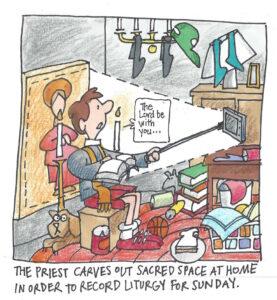
|
Worship the Lord in the beauty of holiness. A Prayer for Church Musicians and Artists: Final stanza of hymn: Fairest Lord Jesus First two stanzas of hymn: For the beauty of the earth
For the beauty of the earth, For the beauty of the skies, For the Love which from our birth over and around us lies: Christ, our God, to Thee we raise,
This our Sacrifice of Praise.
For the beauty of each hour, Of the day and of the night, Hill and vale, and tree and flower, Sun and moon and stars of light: Christ, our God, to Thee we raise, This our Sacrifice of Praise.
|
Beauty
I like my routines. Truth be told, I’m a little nutty about them. Family can attest. I wake up same time every morning. Set my phone for duration of morning devotions. Then a certain amount of time for exercise. Then a walk for another fixed period of time, no more, no less, timed exactly for the top of the hour newscast, which I watch for a prescribed amount of time. Then on to tasks of day, with both a full and an abridged to-do list, ready for things to be crossed off. I sometimes add things to the list that I’ve already done so I can cross them off. Nutty. Even and especially in COVID, it has been important for me to observe rituals, rigidly keeping this rhythm.
Unless, as happened last week, I’m on my fixed period of walking along the shore and up ahead, in the early morning light, I see a crowd gathered. As I near this group, I see that they are focused on about half a dozen dolphins, literally about six feet from water’s edge, as close to the shore as I’ve ever seen. It is simply beautiful. I stand and watch. I walk back and forth with the dolphins, joined by some other folks. Not much else mattered in those moments. Time kind of stopped. Well constructed morning routine became irrelevant. Beauty and grace interrupted daily ritual.
The church where I serve these days is observing the Easter season by focusing on the beauty of holiness. Members of the congregation engaged with creative activity (music, art, poetry, architecture, liturgy) share how those explorations bring them in closer touch with God. After a year of COVID, amidst seasons of violence, it feels meet and right to focus on the lovely and loving ways God’s holy presence can still shine through. Of course, we add to those artistic endeavors the celebration of the beauty of creation. We just observed Earth Day, which tells us that we are surrounded by the results of the divine intention to create beauty. As the psalmist says, the earth is filled with God’s love.
I noted recently that Christ Church Cranbrook includes “Sharing Beauty” in its 4-fold vision statement. That comes from Strategic Planning conversations where a team identified the unique ability for art and music to mediate differences and distances (such as urban Detroit and suburban Bloomfield Hills), but also culture, race, as well as its unique power to speak the gospel. (Check out the Cranbrook Project, the programmatic arm of that vision, as well as partnerships with the arts community of Detroit. The Cranbrook Project – CCC
The goals of the Cranbrook Project are to:
- Enhance cooperation between different religious, ethnic, racial and economic communities in Metropolitan Detroit;
- Encourage collaboration between activists, artists, academics, and members of the interfaith community in Southeastern Michigan;
- Foster greater social engagement and responsibility through Jazz, Contemporary Art, and the Environment;
- Support Christ Church Cranbrook as a beacon for community engagement, leadership, and care for the wider community.
And all of it has to do with beauty.
Undergirding all of this is the beauty of God’s love. Grace, a rich word, suggests unmerited favor. It also suggests beauty. Isaiah puts it this way: How beautiful upon the mountains are the feet of the messenger who announces peace, who brings good news, who announces salvation, who says to Zion, “Your God reigns.” (Isa. 52:7) So we gather, even in COVID-tide, called by the refrain throughout the psalms which invites us to worship the Lord in the beauty of holiness.
Newsflash: There is much in our world that is not beautiful. Our reflection on beauty does not deny that harsh reality. But maybe this week in the rhythms and rituals of our lives, we can take the time and make the space, allowing beauty to interrupt, giving thanks for where we see it, recognizing it as reflection of God’s nature, in the process allowing us to build bridges where there is division.
Here’s a thought: each day this week, take a few minutes to savor a work of art, or listen to a piece of music, or get out in nature where God’s creativity interrupts. Let it lead you to worship. Let it bring you joy.
-Jay Sidebotham

Our Churches After Covid
Wednesday, May 12 at 7pm EST
- The Rev. Chris Harris, Associate Rector, Christ Church Cranbrook, Bloomfield, Michigan
- The Rev. Edwin Johnson, Rector, St. Mary’s Church, Dorchester, Massachusetts
- The Rev. Marissa Rohrbach, Rector, St. Matthew’s Church, Wilton, Connecticut.
We’re grateful for the insights these three will offer, and we’ll make sure to have time for comments and questions.
RenewalWorks: Connect seeks to gather folks who want to continue to explore spiritual growth as priorities in their congregations. All are welcome.
Be sure to receive the Zoom invitation by joining the RenewalWorks: Connect email list. Click here to join.



 pandemic impacted your own heart and the hearts of your congregation’s clergy and lay leaders? You’ve navigated a crisis. It might be time to check in with yourself and other leaders about whether or not you’re making personal spiritual growth a priority. Is it time for a retreat? For connecting with colleagues or a mentor? Is it time to get back to daily spiritual practices neglected during this past year? The leader’s heart is the critical element for spiritually vital congregations.
pandemic impacted your own heart and the hearts of your congregation’s clergy and lay leaders? You’ve navigated a crisis. It might be time to check in with yourself and other leaders about whether or not you’re making personal spiritual growth a priority. Is it time for a retreat? For connecting with colleagues or a mentor? Is it time to get back to daily spiritual practices neglected during this past year? The leader’s heart is the critical element for spiritually vital congregations. According to research, the primary catalyst for spiritual growth is engagement in scripture. Whatever your future plans entail, scripture can be incorporated. It can be as simple as beginning meetings (even those about church business!) with 10 minutes of scripture reflection. It can mean launching a church-wide challenge to read a book of the Bible together to ce
According to research, the primary catalyst for spiritual growth is engagement in scripture. Whatever your future plans entail, scripture can be incorporated. It can be as simple as beginning meetings (even those about church business!) with 10 minutes of scripture reflection. It can mean launching a church-wide challenge to read a book of the Bible together to ce and letting them know they are loved and appreciated. Economic need is great. Invite folks to support a food pantry or community vaccine clinic with time, talent, and treasure. Share a prayer or blessing when you give out a bag of food or vaccine.
and letting them know they are loved and appreciated. Economic need is great. Invite folks to support a food pantry or community vaccine clinic with time, talent, and treasure. Share a prayer or blessing when you give out a bag of food or vaccine.